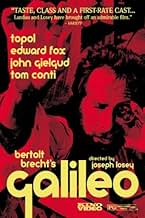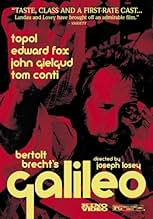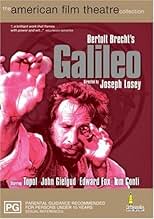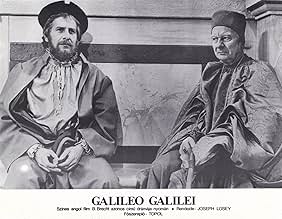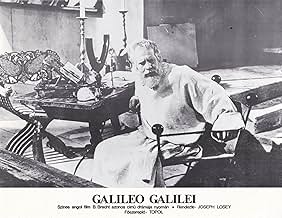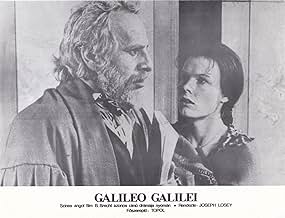Galileo Galilei, his telescopic discoveries, support of Copernican theory, conflict with Catholic Church leading to imprisonment, and influence on future scientists like Newton and Kepler.Galileo Galilei, his telescopic discoveries, support of Copernican theory, conflict with Catholic Church leading to imprisonment, and influence on future scientists like Newton and Kepler.Galileo Galilei, his telescopic discoveries, support of Copernican theory, conflict with Catholic Church leading to imprisonment, and influence on future scientists like Newton and Kepler.
Featured reviews
This fine work by Berthold Brecht and directed by Joseph Losey is brought to us
by about a 20 year delay period. That was because of the House Un-American
Activities Committee and the blacklisting of both.
Brecht kind of, sort of made his case for HUAC as he went back to East Germany where he was acclaimed a cultural icon. Joe Losey took off for Great Britain where he worked for the most part until his death.
You can see why the mossbacks of HUAC thought Galileo by Brecht was highly subversive stuff. Question church authority and by implication the state because religion was established. No more so than in Italy and its many Catholic city/states.
Galileo Galilei scientist/engineer was a popular well respected fellow who got a hold of a spyglass invented by the Dutchman Hans Lippershey and saw the possibilities for it in astronomy. Already a believer in the theory advanced by Copernicus about the sun being a center of the universe. The telescope allowed Galileo to observe and make more findings. If the Earth is the center of things than what are those bodies orbiting Jupiter for instance?
The Roman Catholic now engaged in a counter attack against all that Protestant type heresy took a dim view of this stuff. Galileo got vigorously questioned for these theories.
Israeli actor Topol plays the bluff and hearty Galileo. He's a man used to his creature comforts and not built for martyrdom as is shown in the play.
The fine cast Losey assembles includes Clive Revill and Georgia Brown as cabaret singers, Michael Lonsdale as Pope Urban, and Edward Fox as the Cardinal Inquisitor. John Gielgud has a great cameo as a cardinal who is beside himself with indignation that anyone would question the workings of the universe, their universe.
Galileo's epitaph despite his failure to martyr himself is the best of all. No amount of proclamations from the state or the pulpit will change the way the universe works.
That IS subversive stuff.
Brecht kind of, sort of made his case for HUAC as he went back to East Germany where he was acclaimed a cultural icon. Joe Losey took off for Great Britain where he worked for the most part until his death.
You can see why the mossbacks of HUAC thought Galileo by Brecht was highly subversive stuff. Question church authority and by implication the state because religion was established. No more so than in Italy and its many Catholic city/states.
Galileo Galilei scientist/engineer was a popular well respected fellow who got a hold of a spyglass invented by the Dutchman Hans Lippershey and saw the possibilities for it in astronomy. Already a believer in the theory advanced by Copernicus about the sun being a center of the universe. The telescope allowed Galileo to observe and make more findings. If the Earth is the center of things than what are those bodies orbiting Jupiter for instance?
The Roman Catholic now engaged in a counter attack against all that Protestant type heresy took a dim view of this stuff. Galileo got vigorously questioned for these theories.
Israeli actor Topol plays the bluff and hearty Galileo. He's a man used to his creature comforts and not built for martyrdom as is shown in the play.
The fine cast Losey assembles includes Clive Revill and Georgia Brown as cabaret singers, Michael Lonsdale as Pope Urban, and Edward Fox as the Cardinal Inquisitor. John Gielgud has a great cameo as a cardinal who is beside himself with indignation that anyone would question the workings of the universe, their universe.
Galileo's epitaph despite his failure to martyr himself is the best of all. No amount of proclamations from the state or the pulpit will change the way the universe works.
That IS subversive stuff.
Galileo wheedles, cajoles, and instructs in this filmed stage version of Bertold Brecht's play, as translated by Charles Laughton.
Director Joseph Losey had directed its Broadway debut eight years earlier, and it's offered as a stage show, albeit with cinematographer Michael Rand offering a variety of angles and editor Reginald Beck trying his hardest.
It's one of those shows that is a hagiography, as Topol ages and looks weary, but maintains his childlike wonder. It's got some stage luminaries giving restrained performances -- except for John Gielgud as an elderly, ranting cardinal. The great charm of this production is, of course, seeing these fine stage actors in their natural medium. With Edward Fox, Margaret Leighton, Clive Revill and Tom Conti.
Director Joseph Losey had directed its Broadway debut eight years earlier, and it's offered as a stage show, albeit with cinematographer Michael Rand offering a variety of angles and editor Reginald Beck trying his hardest.
It's one of those shows that is a hagiography, as Topol ages and looks weary, but maintains his childlike wonder. It's got some stage luminaries giving restrained performances -- except for John Gielgud as an elderly, ranting cardinal. The great charm of this production is, of course, seeing these fine stage actors in their natural medium. With Edward Fox, Margaret Leighton, Clive Revill and Tom Conti.
10pholmer
I wrote a previous comment on the film of Bertolt Brecht's play "Galileo" a few years ago. Since it's posted here I will try not to repeat myself. However, comments from other reviewers need addressing, especially since this film is finally out on DVD and more people may be interested in seeing it. Brecht's intent in this play, which he wrote and rewrote over a period of thirty years, was never intended to be a "biography" of the scientist. Brecht was a Marxist and he saw theatre as a means of propaganda, to jolt viewers out of their complacency, to shake up their way of thinking and their view of the world. How well he succeeded may be open to question, but it is important to understand his intent and point of view. To this end he incorporated what he called the "alienation effect" into his plays. He did not want viewers to get emotionally involved in the characters or experience a catharsis afterward. He wanted to address them directly and tell them that there were important ideas being presented and they should pay attention and think about them. He did not want his audience to be "entertained". If you ever see a production of his "Three-Penny Opera", for instance, the characters come out to the front of the stage and sing little lectures to the audience. The best known tune from this show, "Mack the Knife" is not the swinging jazzy Bobby Darin version, but is supposed to be sung in a grating, irritating voice. This is perhaps the most obvious example of Brecht's alienation effect. In "Galileo" this effect is less apparent, perhaps because this play leans toward the genre of realism more than most of his other plays. It is a rather straightforward, narrative story. In the film the choir boys sing between what would be different scenes in the play. In the play, the lyrics the boys sing are supposed to be on a sign or projected on a screen to bring the tell the audience the year, the place and the general theme of the upcoming scene. Why the producers or director chose to use the choir boys for this purpose, I cannot say and I do think the message get lost in their shrill soprano voices. But for Brecht, this was to be his alienation effect in "Galileo", a break in the action to remind the audience not to get involved in the storyline or the characters, but to pay attention to the ideas he is presenting. I'm pretty sure that the choir boys are in this film to do the same thing, to break up the narrative, to take the focus off the characters in the story, and to communicate the information about the next scene in a way unrelated to the rest of the play. If only they weren't so screechy! One last comment about Brecht & Galileo, the character. I mentioned that Brecht rewrote this play several times, He did this because he was unhappy that actors portrayed Galileo too sympathetically; Brecht wanted him to be a villain, a coward and a betrayer of humanity. Actors, however, were seduced by the slyness and humor of the character. Charles Laughton, who worked with Brecht to translate "Galileo" into English in the late 1940's was among those who couldn't avoid making Galileo likable. Brecht admired Laughton's theatre craftsmanship as they rehearsed the play, but was horrified to find the audience liked the character of Galileo & saw him as a hero instead of a villain. Brecht tried and tried to make Galileo unlikable but never succeeded. Years later, after he have returned to communist East Germany he again tried to make Galileo despicable rather than heroic. But even though he had his own Marxist theatre company in a Marxist country with Marxist actors, his audiences still loved Galileo. It may be the only time a character defeated the author who had created him.
Bertolt Brecht is a great playwright. And Joseph Losey (during his self exile in the UK) captured the essential Brecht (originally in German) in English, complete with the choruses. The performances and the subject make you love this forgotten film that is laudable for its contribution to the world of evolved theater. It also presents Topol, Edward Fox, Michel Lonsdale and Judy Parfitt in memorable roles.
Joseph Losey's adaptation of Bertold Brecht's controversial play about the famous philosopher and scientist. The story focusses on Galileo's run in with the Catholic Church, who whilst largely accepting his scientific evidence on a number of issues, particularly that the Earth was not a stationary object at the centre of the universe, were not prepared for it to be accepted truth. They simply could not allow this scientific fact to interfere in the order of things, particularly in their view the undermining of god and the church first and foremost.
An exception cast has been pulled together to tell the story and it is an absorbing tale, essentially delivered as a play with no exterior shots to be seen. The cast are universally good, although, I was never entirely convinced by Topol in the lead.
An exception cast has been pulled together to tell the story and it is an absorbing tale, essentially delivered as a play with no exterior shots to be seen. The cast are universally good, although, I was never entirely convinced by Topol in the lead.
Did you know
- TriviaJoseph Losey had also directed the original Broadway production of "Galileo," 28 years previously.
- GoofsAfter the crier announces Galileo Galilei's recantation, a chessboard is seen on the left side of the screen: all the pieces are upright. As Galileo enters, a new shot shows that one of the pieces has been toppled. In the next shot, all the pieces are again upright (1:57:50-1:58:10).
- Quotes
Andrea Sarti: [upon Galileo's recantation] Unhappy is the land that has no heroes.
Galileo Galilei: Incorrect. Unhappy is the land that *needs* a hero.
- ConnectionsFeatured in Zomergasten: Episode #23.1 (2010)
- How long is Galileo?Powered by Alexa
Details
- Release date
- Countries of origin
- Language
- Also known as
- Galileo Galilei
- Filming locations
- Production companies
- See more company credits at IMDbPro
- Runtime
- 2h 25m(145 min)
- Sound mix
- Aspect ratio
- 1.85 : 1
Contribute to this page
Suggest an edit or add missing content


